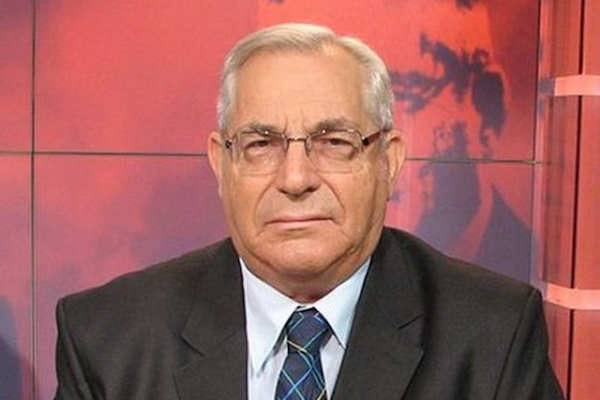One of Israel’s most iconic television personalities passed away on Friday morning, leaving behind him a media landscape lacking the fierce criticism that Moti Kirschenbaum was so well known for. Elinor Davidov, who worked with him for many years, says goodbye.
By Elinor Davidov
I am trying to imagine what Moti would say about this Kirschenbaum festival taking place over the last day. He would tell people to go off the air, since, well, what’s the big deal? Are we at war? Do we really need rolling coverage? And how many times can we hear and see the very same thing? He would have laughed at Netanyahu’s eulogy and likely made a sarcastic remark about Herzog’s, he would have become embittered by the kitsch, bemoaning the entire situation: “This is your country, I won’t be here when you need to deal with all of this.” And now he is really no longer here, and I am trying to think about the Israeli media without him, without his show “London and Kirschenbaum” every night.
My friends and acquaintances hold one of two views about the show. According to one view, London and Kirschenbaum was the last Mohican, a symbol of quality work in a sea of shallow and self-righteous trash. According to the other view, Moti represented the rule of the white, male, Zionist regime — a man who had a hand in creating the “white tribe” that wanted to hear its voice and its voice alone. This was the voice of the liberal Zionist left: no women, ultra-Orthodox, or settlers. For me, the truth lies somewhere between the two, although it leans far more toward the first.
Moti’s journalistic standards included endless updates on everything that was happening at any given moment, a real love for the camera and all it captured — real empathy toward his interviewees, the heroes of his reports and movies, an honest attempt at portraying reality “objectively,” along with expressing his clear, uncensored opinions. He had respect for all people, and above all, the ability to tell a good story, to laugh at everything — especially hypocrisy, self-importance, and pomp.
The Moti I knew during the years I edited London and Kirschenbaum insisted on presenting both sides, although it was clear to which side he belonged. In today’s media, especially television, it seems that we can no longer find anyone who will voice a slightly more critical opinion — someone who will expose the viewers to what is happening beyond the breaking news. Yes, Moti is a founding father of Israeli television in many respects, but since those years much has happened to TV here, and its gradual commercialization has not brought a wealth of opinions and criticism of the establishment. In fact the opposite is true: media slowly began moving toward the center-right under the guise of what many viewers actually view as “The Left”. Yes, we are glad that one can find ultra-Orthodox, religious, leftist, etc. news outlets on Internet, but the dominant voice on the two main news stations is unmistakable — it is the voice of the establishment.
Yes we have excellent journalists in Israel who investigate, fact check, and publish. But unfortunately many of them hold the antiquated view that there is such a thing as “objective reality,” and that the job of the media is to present that reality to the viewer. What they see as “reality” is, in the eyes of many, including myself — and I would venture to guess Moti’s as well — a representation of a very particular voice presented in a very particular way. As opposed to them Moti argued on air, pointed at what he thought was immoral behavior, insisted on inviting more and more women to the studio, and voiced his opinion, even if not directly at the camera.
In addition to his grinding, day-to-day work on the show, Moti continued to write plays. In his final play he spared no one, especially himself — since most of the people working in the media were not willing to be identified with a play whose text isn’t exactly clear and which unambiguously says the same thing for the hundredth time: end the occupation and the unjust wars.
His willingness to say what he believed, and first and foremost oppose the injustices Israel is committing in the occupied territories, is not self evident. It cannot be. The radical left today tends to judge a person according to his origin and social class. I ask that we deviate from this narrow perspective since in my eyes, sometimes it is more radical to express unusual opinions rather than to represent all the marginalized groups in oneself.
In the days where Kushmarism reigns, when most of the studios are full of arrogant security experts and IDF press releases, when most journalists go far too easy on policymakers, Moti and his show were an exception. There is good and there is bad, there is no post-modern spectrum of views. We must talk about the bad, protest against it, explain it. We must promote the good, show it, and make it stronger. For me, that is Moti Kirschenbaum.
And on a more personal note, Moti was simply a mensch. Just like that. The kind of person you could count on. The kind of person whom you could love with all your heart and know that he will return that love. I think he loved me, and I loved him back.
Elinor Davidov is a journalist and deputy editor of ‘London and Kirschenbaum.’ This article was first published in Hebrew on Local Call, where she is a blogger. Read it here.


